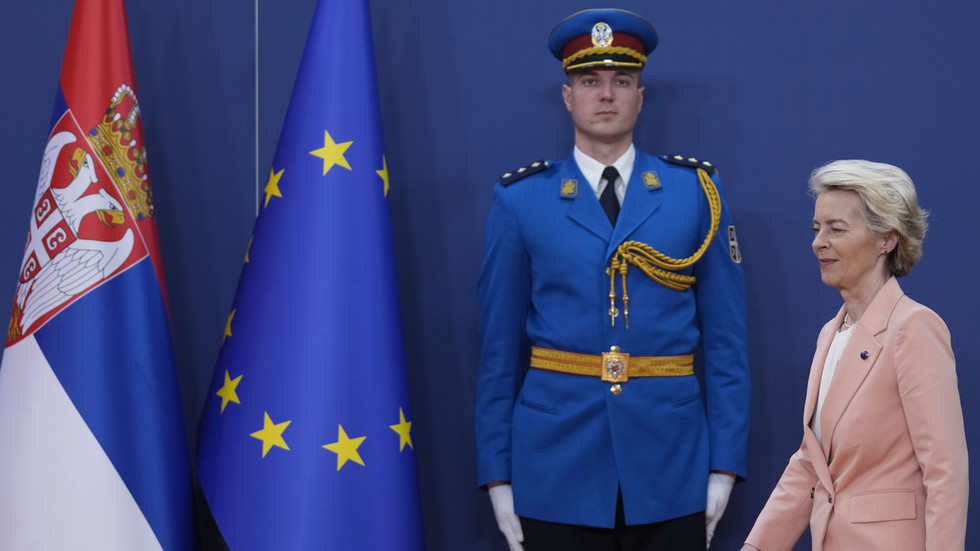In a notable diplomatic development, European Commission President Ursula von der Leyen has canceled her planned meeting with Serbian Prime Minister Milos Vucevic during her visit to the Balkans. The cancellation was prompted by Vucevic’s recent engagement with Russian Economic Development Minister Maksim Reshetnikov, which raised concerns in Brussels regarding Serbia’s intentions to strengthen its economic ties with Russia. This incident highlights the growing tensions between Serbia’s aspirations to join the European Union (EU) and its current geopolitical alignment with Russia, as Serbia’s leaders have publicly appreciated Moscow’s support regarding sovereignty and territory.
During her visit, von der Leyen met with Serbian President Aleksandar Vucic but ultimately decided against the meeting with Vucevic to express disapproval of Serbia’s continued partnership with Russia. The decision reflects the EU’s broader concerns about Serbia’s foreign policy, particularly its refusal to impose sanctions against Russia, which has consolidated following the invasion of Ukraine. Vucevic’s gratitude towards Russia for its support for Serbia’s claims over Kosovo, as well as participation in BRICS meetings, further illustrates the complexity of Serbia’s geopolitical positioning and its balancing act between East and West.
Vucevic’s interaction with the Russian official underscores Serbia’s strategic stance of military neutrality and its resistance to Western pressures to conform its foreign policy to that of the EU. Serbia has repeatedly maintained its stance on not aligning with EU sanctions against Russia, which is a significant point of contention as the EU pressures candidate nations to adhere to its foreign policy framework. The Serbian leadership’s consistent emphasis on military neutrality reflects a broader strategy aimed at maintaining autonomy in foreign relations, particularly amidst ongoing regional tensions and conflicting alliances.
The situation is further complicated by the historical narrative that Serbia presents regarding its sovereignty, particularly concerning Kosovo. Serbian leaders, including Vucic, have articulated frustrations with the perceived hypocrisy of Western nations that advocate for Ukrainian territorial integrity while simultaneously pressuring Serbia to recognize Kosovo’s independence. This parallel has become a cornerstone of Serbia’s diplomatic discussions, allowing government officials to reinforce national pride and sovereignty while dismissing international pressures as inherently contradictory.
While Serbia officially aspires to EU membership, Vucic’s administration faces a delicate balancing act. The conditions set by the EU for membership—including the recognition of Kosovo’s independence and aligning foreign policy with sanctions against Russia—pose significant challenges to Serbia’s political landscape. The government has resolutely declared that it will not cede recognition of Kosovo, which remains a key sticking point in Serbia-EU relations and poses risks to Serbia’s accession ambitions.
The cancelation of the meeting between von der Leyen and Vucevic serves as a clear indication of the increasing complexities in Serbia’s political maneuvers within the broader context of its EU aspirations and its enduring ties with Moscow. This incident not only symbolizes the growing rift between Serbia and the EU but also signals a critical moment for Serbia as it navigates the intricate reality of modern geopolitics in the Balkans, where historical tensions, national interests, and international relations intertwine. As Serbia stands at this crossroads, the decisions made by its leaders will significantly shape its future in relation to both the EU and Russia.

